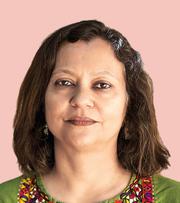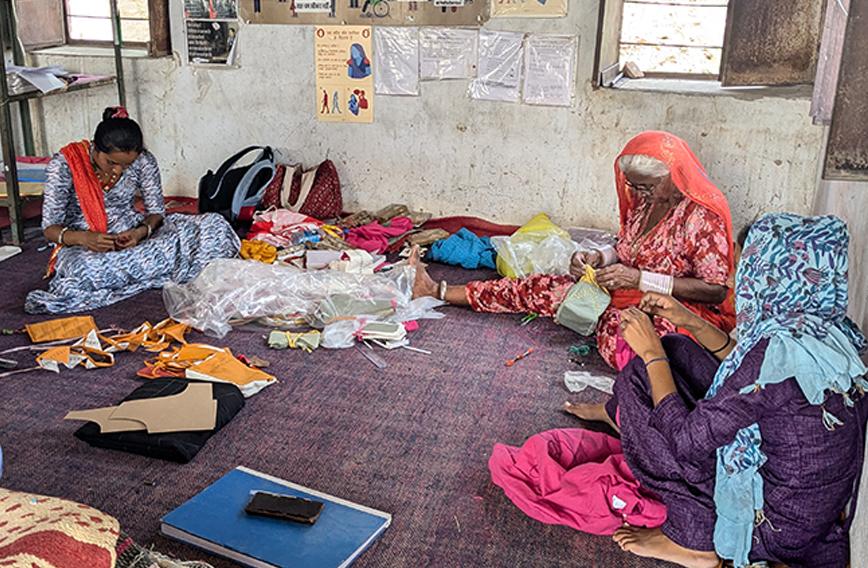
SUMITA GHOSE
I began working in Mumbai (then Bombay) as a young woman of 20. My workplace was safe, but I had to remain vigilant during my bus rides to work to avoid unwanted proximity from men. I carried a large safety pin for protection, just in case.
Some years later, working in rural Rajasthan, I began to grasp the literal meaning of the phrase, “It’s a man’s world”. There was minimal space for women outside their homes, except for agricultural work, and they rarely ventured out alone. Our organization, the Urmul Trust, was among the first in the remote area of Loonkaransar, to employ women, who travelled to villages in order to gain a better understanding of the challenges faced by other rural women.
We focused on improving maternal and child health in Bikaner district, working with village midwives to teach safe birthing practices and providing advice on nutrition and immunization. This experience revealed the deeply patriarchal and often feudal nature of village society. We found that only older women were permitted to leave their homes, while young mothers and mothers-to-be, whom we wanted to support with pre- and post-natal care, were largely confined to their homes. It took months, and in some cases years, for younger women to come out of their homes even to attend meetings in their villages.
Instances of sexual abuse were rarely reported or taken to the police. We supported one young woman who chose to speak out and file a case, but the lengthy process and eventual ‘compromise’ — where the perpetrator’s family paid off the survivor’s family — illustrated the difficulties in seeking justice and the feudal and patriarchal mindset of the local village leaders.
Nurses, often from Kerala, stationed in remote village centres feared living alone in villages. Similarly, women teachers commuted from their homes to distant villages, often arriving late and returning home after dark, leading to high absenteeism and contributing to the practice of keeping young girls at home, instead of at school.
The 1987 drought drastically changed the situation. Both men and women were compelled to work in drought relief efforts to earn money and food. We launched an income generation programme for women by supplying wool from Bikaner, Asia’s largest wool mandi, to women in their villages. Using milk societies and collection centres as distribution points, we collected handspun wool weekly and made payments. Soon, powerful men in one village objected to women coming to these centres and barred us from entering. However, women, now having had a taste of independence through work, continued to gather on the outskirts of the village to collect raw wool, deposit their hand-spun wool, and receive their earnings. This marked one of the first instances of women stepping beyond their traditionally assigned roles.
When pioneering women challenge patriarchy, they often face societal and institutional resistance. Bhanwari Devi in Rajasthan, who was gang raped by powerful men in her village for protesting against child marriage, became a symbol of the struggle against such oppression. Her case led to the Vishaka Guidelines in 1997 and later the Sexual Harassment of Women at Workplace (Prevention, Prohibition, and Redressal) Act or POSH Act in 2013, which aimed to prevent sexual harassment of women in workplaces.
Although progress has been made, challenges remain. Recent statistics show a decline in women’s workforce participation, particularly in urban areas, partly due to safety concerns and inadequate facilities for working mothers.
In 2006, when we started Rangsutra, all women artisans worked from home due to the lack of designated workspaces. A pivotal moment came when we decided to move away from home-based work and establish small production centres in villages. Initially set up in courtyards and later in proper centres built by local panchayats, these spaces were created in response to women’s demands for a dedicated workspace.
This shift was met with initial reluctance from some women and their families. However, trailblazers like Priyanka emerged, and soon others followed. Priyanka, now in her early twenties, grew up watching her mother, aunts and grandmother create beautiful hand-embroidered art. Her grandmother, a first-generation immigrant, ensured she received an education. Priyanka not only graduated through distance education but also mastered embroidery.
As a crafts manager with Rangsutra, she established a village-based craft centre at her home and later petitioned the local panchayat for land to build a dedicated centre. Today, 20 to 30 women work together at this centre, creating better lives for themselves and their families. Priyanka funded her own college education through her work, and similar centres have sprung up in the Pugal area, thanks to the efforts of empowered village women advocating their own workspaces.
Individual efforts along with collective action and support from local NGOs and government bodies can help women gain more agency at the workplace. But transformative progressive change can happen only when patriarchal institutions in our society, polity and economy make way for egalitarian and cooperative ways of working and living. And for that to happen, all of us, women and men, have to play an active constructive role.
Sumita Ghose is founder-director of Rangsutra Crafts
Comments
Currently there are no Comments. Be first to write a comment!




